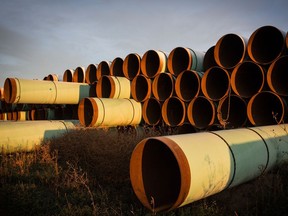Shouldn’t any responsible leader want to regularly consult with industry leaders in the natural resource sector to determine how they can facilitate expansion of the sector’s contribution to Canada’s economy?

Article content
When federal Environment Minister Steven Guilbeault recently criticized Conservative Leader Pierre Poilievre for hosting a fundraiser that included an oil company executive, he raised an interesting question. How should our politicians — of all parties — engage with Canada’s natural resource sector and the industry leaders that drive our natural resource economy?
Advertisement 2
Story continues below
Article content
Consider a recent report by the Chamber of Commerce, entitled Canada’s Natural Wealth, which notes that Canada’s natural resources sector contributed $464 billion to Canada’s economy (measured by real GDP) and supported 3 million jobs in 2023. That represented 21% of the national economy and 15% of employment.
Within the natural resources sector, mining, oil and gas, and pipeline transmission represent 45% of all GDP impact from the sector. Oil and gas production accounted for $71 billion in GDP in 2023. If you throw in the support sector for oil and gas production, and for manufacturing petroleum and coal products, that number reaches nearly $100 billion in GDP.
Shouldn’t any responsible leader want to regularly consult with industry leaders in the natural resource sector to determine how they can facilitate expansion of the sector’s contribution to Canada’s economy?
Article content
Advertisement 3
Story continues below
Article content
The Chamber also notes that the natural resource sector is a massive contributor to Canada’s balance of trade, reporting that last year the “sector generated $377 billion in exports, accounting for nearly 50% of Canada’s merchandise exports, and a $228 billion trade surplus (that is, exports over imports) — critical for offsetting trade deficits (more imports than exports) in other sectors.”
Again, shouldn’t all government leaders want to work with industry leaders to promote even more natural resource trade and exports?
Finally, the natural resource sector accounts for one out of every seven jobs in Canada’s economy, and the wages offered in the natural resource sector are higher than the national average —annual wages in the sector were $25,000 above the national average in 2023. And workers in the sector are about 2.5 times more productive, meaning they contribute more to the economy compared to workers in other industries.
Advertisement 4
Story continues below
Article content
One more time — shouldn’t all of Canada’s political leaders, regardless of political stripe, want to work with natural resource producers to create more high-paying jobs for more Canadians?
Finally, the Chamber of Commerce report suggests some environmental policies require swift reform. Proliferating regulations have made investing in Canada a “riskier and more costly proposition.” The report notes that carbon pricing, Clean Fuel Regulations, proposed Clean Electricity Regulations, proposed federal emissions cap and proposed methane regulations all deter investment in Canada. Which means less economic opportunity for many Canadian workers.
With so much of Canada’s economic prosperity at stake, it’s not improper — as Guilbeault and others suggest — for any politician to meet with and seek political support from Canada’s natural resource industry leaders. Indeed, to not meet with and listen to these leaders would be an act of economic recklessness and constitute imprudent leadership of the worst kind.
Kenneth Green is a senior fellow at the Fraser Institute.
Article content
Comments